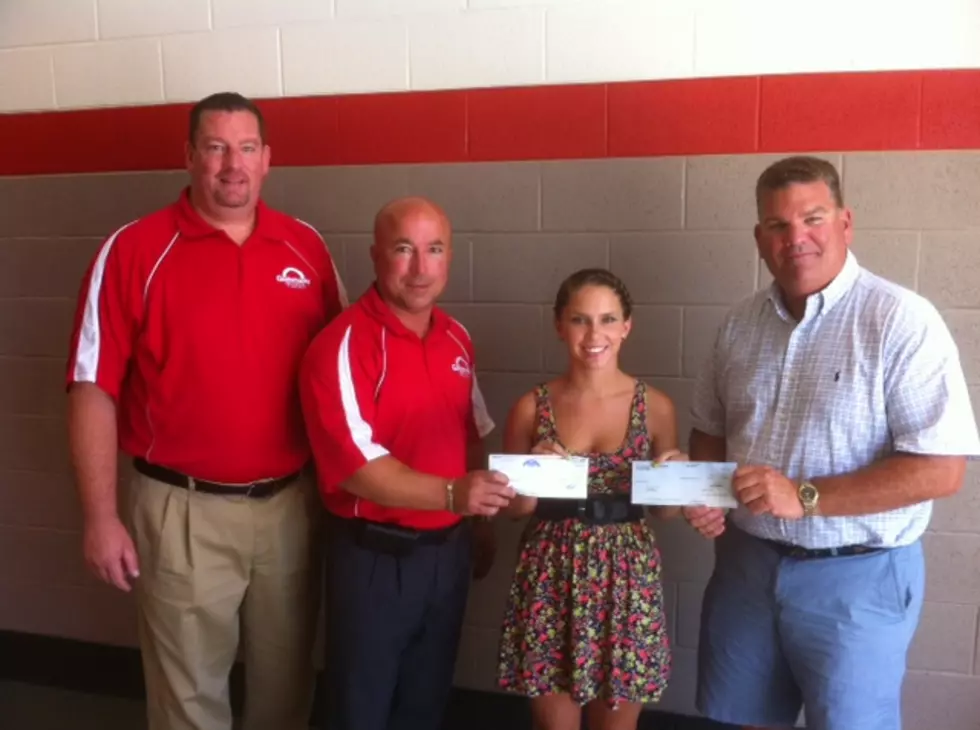![Thunderstorms Cross New Jersey [VIDEO]](http://townsquare.media/site/394/files/2012/07/Sun4.jpg?w=980&q=75)
Thunderstorms Cross New Jersey [VIDEO]
A line of strong thunderstorms rolled through the state on Thursday evening.
The storms had gusts up to 60 MPH, heavy rain, frequent lightning and quarter-sized hail. Temperatures that had been in the 90′s dropped 20 degrees in a half-hour as the storms approached.
The storms knocked out power to 13,000 JCP+L customers with Monmouth County having 6,000 customers in the dark at 10:20PM according to JCP+L’s outage map. Gloucester County residents of Atlantic City Electric are also dark.
PSE+G’s outage map shows outages in its service areas with Bergen, Camden, Middlesex & Somerset counties especially hard hit.
The storm brought down trees on Route 27 in New Brunswick and on the Garden State Parkway in East Orange according to New Jersey Fast Traffic which were cleaned up. NJ Transit had a downed tree in Middletown causing delays on the Jersey Coastal line while Newark Liberty Airport has flight delays of at least 2 hours on all flights.
Watch the sky turn color as the storm moves in West Trenton.
A tornado may have touched down in Elmira, New York this afternoon with many fires and downed power lines. Some streets are impassable due to fallen trees and power lines.
The National Weather Service issued its first tornado warning at 3:35 p.m. and have received reports of fallen trees and siding damage.
Meanwhile, authorities are evacuating campers in tents from 10 campgrounds across the state with a wave of severe storms expected through the afternoon and evening.
Upload your storm damage pictures using the form below!
THE HEAT RETURN ON FRIDAY
Tomorrow it’s back into the oven as Mercer, Camden, Gloucester, Cumberland, Salem and parts of Burlington counties are under an Excessive Heat Warning issued by the National Weather Service through tomorrow afternoon at 6PM with upper 90s with a heat index of 109.



Keeping Your Car Cool
Source: AAA Mid Atlantic
Heat Can Zap the Life from Batteries – Most drivers think battery problems occur primarily in winter, but summer heat can negatively impact your car’s battery even more than the bitter cold of winter. Heat and vibration are a battery’s two worst enemies leading to internal breakdown and eventual failure. While drivers cannot do much about the heat, they can make sure their battery is securely mounted in place to minimize vibration.
Keep Your Engine Cool – Automobile engines work extra hard in the summer, and it is the cooling system’s job to protect the engine from overheating. In addition, additives in the coolant protect the radiator and internal engine components against wear and corrosion. Without proper cooling system maintenance, the odds of long term engine damage, and a summer time boil over, definitely increase.
Maintain Proper Tire Pressure - Driving on under-inflated tires not only affects the handling and braking of a vehicle, it also can cause tires to overheat and increase the likelihood of a blowout. This problem becomes even more of a concern when road temperatures are extremely high. Tires should be checked when the car has not been driven recently, and they should be inflated to the pressure recommended by the vehicle manufacturer—not the number molded into the tire sidewall. Recommended tire pressures can be found in the owner’s manual or on a sticker normally located on the driver’s door jamb. Some vehicles use different pressures for the front and rear tires.
Check Vehicle Fluids – Engine fluids are essential to keeping a vehicle running smoothly. Most fluids not only lubricate, they also serve as coolants by helping carry heat away from critical components. When fluid levels are low, this cooling effect is reduced, and the possibility of overheating increases. Drivers to should check all vehicle fluids including motor oil, transmission fluid, power steering fluid and brake fluid to ensure they are filled to the appropriate levels. If any fluids need to be topped off, be sure to use the type of fluid specified in the owner’s manual.
Child Safety Heat Tips
source: National Weather Service
Make sure your child’s safety seat and safety belt buckles aren’t too hot before securing your child in a safety restraint system, especially when your car has been parked in the heat.
Never leave your child unattended in a vehicle, even with the windows down.
Teach children not to play in, on, or around cars.
Always lock car doors and trunks–even at home–and keep keys out of children’s reach.
Always make sure all children have left the car when you reach your destination.
Adult Heat Wave Safety Tips
Slow down. Reduce, eliminate or reschedule strenuous activities until the coolest time of the day. Children, seniors and anyone with health problems should stay in the coolest available place, not necessarily indoors.
Dress for summer. Wear lightweight, light-colored clothing to reflect heat and sunlight.
Put less fuel on your inner fires. Foods, like meat and other proteins that increase metabolic heat production also increase water loss.
Drink plenty of water, non-alcoholic and decaffeinated fluids. Your body needs water to keep cool. Drink plenty of fluids even if you don’t feel thirsty. Persons who have epilepsy or heart, kidney or liver disease, are on fluid restrictive diets or have a problem with fluid retention should consult a physician before increasing their consumption of fluids. Do not drink alcoholic beverages and limit caffeinated beverages.
During excessive heat periods, spend more time in air-conditioned places. Air conditioning in homes and other buildings markedly reduces danger from the heat. If you cannot afford an air conditioner, go to a library, store or other location with air conditioning for part of the day.
Don’t get too much sun. Sunburn reduces your body’s ability to dissipate heat.
Do not take salt tablets unless specified by a physician.
The National Weather Service contributed to this story.
More From 92.7 WOBM

![Do You Indulge Your Kids? [Poll]](http://townsquare.media/site/394/files/2012/07/Headphones.jpg?w=980&q=75)




![Miracle Treat Day at Dairy Queen For Childrens Miracle Network [AUDIO]](http://townsquare.media/site/394/files/2012/07/Hometown-Crew2.jpg?w=980&q=75)


